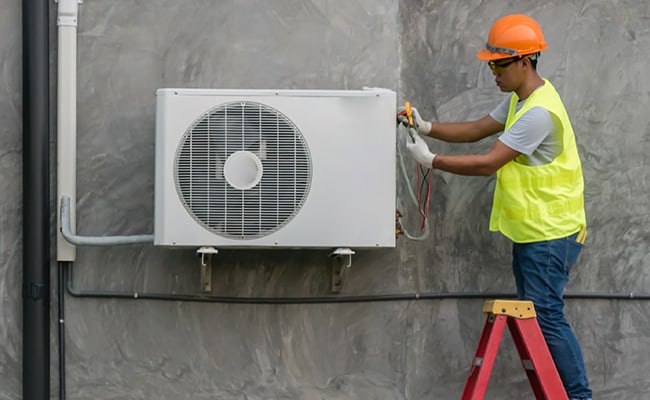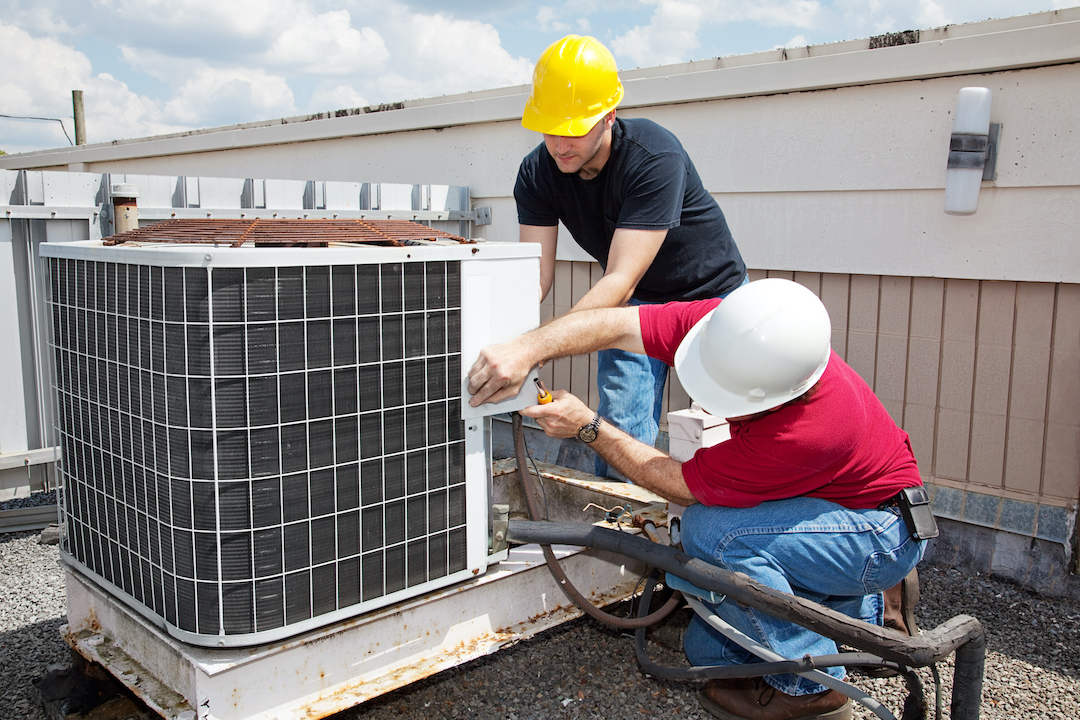Choosing the Right Model for heat pump installation ooltewah tn
Choosing the Right Model for heat pump installation ooltewah tn
Blog Article
Choosing Between a Warm Pump and Heater: Secret Considerations for Your A/c Needs
When reviewing heating options for HVAC needs, the decision in between a warm pump and a furnace can be complex. Each system provides distinct advantages customized to details climates and energy performance objectives. Comprehending these differences is necessary for making an educated choice. Trick variables such as setup prices and ecological effect further make complex the choice process. Which choice really lines up with one's comfort and sustainability preferences? The following sections will certainly check out these factors to consider thoroughly.
Recognizing Warm Pumps: How They Function and Their Benefits
While lots of property owners consider numerous heating choices, recognizing exactly how heat pumps function and their advantages can substantially affect their decision. Warm pumps run by moving heat instead than generating it. In the winter months, they draw out warmth from the outdoors air or ground and transfer it inside, while in the summer, they reverse this procedure, cooling down the home by removing warm outside. This twin functionality makes them flexible for year-round environment control.One of the key benefits of heatpump is their power efficiency. They utilize substantially much less electrical power compared to standard heater, potentially leading to lower energy costs (furnace replacement). In addition, heatpump have a smaller carbon footprint, making them an eco pleasant option. They likewise need less maintenance than standard systems, contributing to long-term expense financial savings. Overall, understanding the technicians and advantages of heatpump can help property owners make notified decisions regarding their heating and cooling needs
Discovering Heating Systems: Kinds, Procedure, and Advantages
Furnaces can be found in various types, including gas, electric, and oil versions, each with distinctive functional systems. Understanding these differences is vital, as they affect efficiency and home heating efficiency. Furthermore, heaters supply countless advantages, such as consistent heat output and integrity in chillier environments.
Sorts of Heating systems
Furnace can differ substantially in style and procedure, with heaters being a prominent choice among house owners. There are several sorts of furnaces, each utilizing different gas resources and innovations. Gas heaters are typical, leveraging gas to create heat successfully. Electric heating systems, on the various other hand, use electric resistance to produce warmth, frequently preferred for their straightforward installment. Oil heating systems, while much less common, are effective in locations with limited gas accessibility (heat pump replacement ooltewah tn). Additionally, condensing heaters optimize energy performance by reusing and catching exhaust gases. Each kind operates via a system of heat exchangers and ductwork to distribute cozy air throughout a home. Comprehending the differences between these heater types is necessary for informed cooling and heating decisions
Advantages of Heaters
For homeowners seeking reputable warmth throughout chilly months, the benefits of furnaces are considerable. Heaters offer regular home heating, guaranteeing also temperature levels throughout the home. They are particularly efficient in extreme cold, usually exceeding heat pumps in freezing conditions. Numerous kinds, including gas, electric, and oil heating systems, provide adaptability to fulfill varied needs and preferences.Furnaces also have a tendency to have lower preliminary installment prices contrasted to warmth pumps, making them a more available choice for lots of. Their durable style adds to a much longer lifespan, with numerous units lasting over 15 years with proper maintenance. Furthermore, contemporary heating systems are typically furnished with sophisticated innovation for enhanced performance, which can cause lowered power expenses. Generally, heating systems stay a reliable choice for reliable home heating.

Power Efficiency: Contrasting Heat Pumps and Furnaces
When contrasting power performance in between warm pumps and heating systems, the Seasonal Energy Performance Proportion (SEER) plays a vital function in determining performance. Furthermore, a functional cost analysis reveals the long-term economic implications of each system. Understanding these aspects can assist homeowners in making informed decisions about their home heating remedies.
Seasonal Power Performance Proportion
Power efficiency plays an essential function in the decision-making procedure in between heatpump and heaters, specifically when considering the Seasonal Energy Performance Ratio (SEER) This metric steps the cooling effectiveness of heatpump over a whole air conditioning period, providing a standardized way to assess efficiency. Greater SEER rankings show greater energy effectiveness, converting to reduced power consumption and reduced energy costs. On the other hand, heaters are commonly analyzed making use of the Yearly Fuel Utilization Efficiency (AFUE) ranking, which mirrors home heating effectiveness. When comparing these two systems, home owners must focus on SEER ratings for heat pumps, as they directly influence total power savings and environmental sustainability. An extensive understanding of SEER can notably influence the long-term satisfaction and cost-effectiveness of the chosen cooling and heating remedy.
Functional Cost Evaluation
Comprehending the functional expenses connected with warmth pumps and heating systems is essential for house owners examining their options. Heatpump commonly use higher power effectiveness, converting electrical power right into heat with marginal waste. This leads to reduced month-to-month utility expenses, specifically in modest climates. Conversely, standard heaters, particularly gas models, may have lower in advance costs however can incur greater operational costs over time because of sustain prices and efficiency ratings.Moreover, heatpump can function as both heating and cooling down systems, possibly minimizing the demand for separate cooling and heating units. While first investments for warm pumps may be higher, their long-term cost savings in power efficiency can make them a much more cost-effective selection for numerous houses. Mindful analysis of neighborhood energy rates is crucial to establish the finest choice.
Setup Prices: What to Anticipate for each and every Heating System
Installation expenses for heating unit can vary considerably in between warm pumps and heaters, influencing house owners' decisions. Warm pumps typically have greater in advance setup prices, usually ranging from $3,500 to $8,000, depending upon the system dimension and intricacy of setup. This consists of the exterior unit, interior handling system, and necessary ductwork adjustments. On the other hand, heating systems have a tendency to have lower initial expenses, averaging in between $2,500 and $6,000, which can be appealing for budget-conscious home owners. Nonetheless, setup expenses can increase if comprehensive ductwork is required.Moreover, the option of fuel type for furnaces-- natural gas, propane, or electrical-- can additionally influence setup expenses. While warm pumps offer power efficiency, their first financial investment might deter some customers. Inevitably, reviewing installment expenses alongside lasting financial savings and performance will aid home owners in making informed decisions concerning their furnace.
Climate Considerations: Which System Does Better in Your Location
How do climate conditions affect the effectiveness of heating systems? The efficiency of warm pumps and heating systems can differ substantially depending upon the local climate. In modest climates, heatpump succeed by effectively transferring warmth from the outside air, making them an energy-saving alternative. Their effectiveness lessens in exceptionally chilly temperatures, where they might battle to remove adequate warm. Alternatively, furnaces, specifically gas models, provide regular and reputable warmth regardless of outdoor problems, making them more effective in cooler regions.In locations that experience milder winter seasons, warm pumps can run efficiently year-round, supplying both heating & cooling. In contrast, areas with severe wintertimes often benefit from the effectiveness of heaters. Ultimately, understanding the neighborhood environment is vital when choosing between a this content heatpump and a furnace, as it directly affects their operational performance and general performance.
Upkeep Demands: Long-Term Care for Warm Pumps vs. Furnaces
While both warm pumps and furnaces call for routine maintenance to assure peak efficiency, their specific needs and care regimens differ substantially. Heaters normally require much less frequent attention, with annual examinations being enough to examine for gas leaks, tidy filters, and evaluate general capability. Their easier design view it commonly enables for uncomplicated repairs.In contrast, warm pumps require biannual maintenance due to their dual function in heating & cooling. This consists of cleaning coils, examining refrigerant levels, and making certain that both the exterior and interior units operate at their finest. In addition, heatpump upkeep typically entails more elaborate parts, making expert servicing essential.Neglecting maintenance can result in reduced efficiency and boosted energy prices for both systems. Ultimately, homeowners need to consider these long-lasting care needs when picking between a heatpump and a heating system, as aggressive upkeep can extend the lifespan and performance of either system significantly.
Ecological Influence: Picking a Lasting Home Heating Option
The ecological impact of heater is a critical evaluation for house owners looking for lasting alternatives. Warmth pumps are generally much more energy-efficient than conventional heating systems, as they transfer heat instead of generate it, substantially lowering carbon emissions. By utilizing renewable energy sources, such as air-source or geothermal warmth pumps, home owners can better reduce their environmental footprint.On the other hand, gas heaters release greenhouse gases and add to air pollution, though they typically give greater warm output. Nonetheless, innovations in modern technology have actually caused the advancement of high-efficiency heaters that decrease emissions.Ultimately, choosing a heater includes weighing performance versus ecological impact. Property owners are motivated to review neighborhood energy sources and motivations for renewable systems, making sure a selection that aligns with both individual comfort and ecological duty. The decision affects not only prompt comfort yet also long-term sustainability and environmental wellness.
Often Asked Questions
How Much Time Do Warm Pumps and Furnaces Typically Last?
The life-span of heatpump commonly ranges from 15 to two decades, while heating systems can last in between 15 to 30 years. Routine upkeep significantly influences their longevity and performance in providing heating remedies.
Can I Use a Heat Pump in Exceptionally Cold Climates?
Heat pumps can run in incredibly chilly environments, yet their performance decreases as temperature levels decline. In such conditions, supplementary heating go to these guys sources may be needed to keep comfy interior temperatures and ensure peak efficiency.

What Is the Sound Degree of Warm Pumps Versus Furnaces?
The noise levels of heatpump and heating systems vary significantly. Generally, heat pumps run more quietly than conventional furnaces, making them preferable for those delicate to sound, while furnaces might produce louder functional noises during home heating cycles.
Are Heat Pumps Suitable for Both Home Heating and Air conditioning?
Heatpump are undoubtedly suitable for both cooling and heating (ductless mini splits). They operate by transferring warmth, providing effective temperature control year-round, making them a flexible option for house owners seeking an all-in-one heating and cooling solution
What Dimension Heating System Do I Required for My Home?
Determining the proper size heating unit for a home calls for examining factors such as square video footage, insulation quality, neighborhood climate, and the home's design. Consulting a specialist can guarantee an exact assessment and optimal convenience. Heat pumps commonly provide greater power efficiency, converting electrical power right into heat with marginal waste. In modest environments, heat pumps excel by efficiently moving heat from the outside air, making them an energy-saving option. On the other hand, furnaces, especially gas versions, give consistent and dependable warm no matter of outdoor problems, making them better in chillier regions.In areas that experience milder winters months, heat pumps can operate effectively year-round, offering both heating and air conditioning. Heat pumps are usually more energy-efficient than traditional furnaces, as they move warm rather than produce it, greatly minimizing carbon emissions. By utilizing eco-friendly power sources, such as air-source or geothermal heat pumps, property owners can further reduce their ecological footprint.On the various other hand, natural gas furnaces produce greenhouse gases and add to air contamination, though they often supply higher heat outcome.
Report this page